Iranian military activity, support for terrorism, and advancements in nuclear capabilities were the main focus of the U.S.-Israeli Strategic Advisory Group meeting held on June 16 at the White House. National Security Advisor Jake Sullivan and Secretary of State Antony Blinken hosted Israeli National Security Advisor Tzachi Hanegbi and Minister of Strategic Affairs Ron Dermer. All parties reached a consensus on the need to take steps to prevent Iran from developing nuclear weapons.
Iran is a member of the Treaty on the Non-Proliferation of Nuclear Weapons (NPT), and while it claims to comply with its obligations under this treaty, the International Atomic Energy Agency (IAEA) has accused Iran of violating safeguards by concealing parts of its nuclear program and failing to address questions related to potential military dimensions. This led to sanctions from the United Nations Security Council in 2010 aimed at forcing Iran to provide necessary data and suspend all unauthorized enrichment activities. However, in 2019, Iran began violating the limits of the Joint Comprehensive Plan of Action (JCPOA) in response to the United States' withdrawal from the nuclear deal the previous year, marking a significant escalation in its sensitive nuclear activities. At the same time, Tehran reduced access for IAEA inspectors to its nuclear facilities and their monitoring, creating significant gaps in oversight.
Iran resumed activities at the Fordow facility. While these actions were concerning, they were reversible. However, Iran has since taken more significant steps, such as enriching uranium to a level of 60%, which is just below weapons-grade, and using more efficient centrifuges. Tehran has also tested uranium metal production, which is vital for weaponization, and improved successive designs to enable quicker changes in enrichment levels. According to the IAEA, it is technically possible to manufacture an atomic bomb with about 42 kilograms of uranium enriched to 60% if the enrichment is raised to 90%. Since 2020, the IAEA has revealed substantial evidence of Iran's nuclear advancement, indicating it is moving closer to developing nuclear weapons.
In 2023, the IAEA found uranium particles at undeclared sites such as Varamin and Turquzabad, raising concerns over covert nuclear activities. By May 2024, Iran had accumulated an additional 20.6 kilograms of uranium enriched to 60% purity since the IAEA's last quarterly report. With 142.1 kilograms of uranium at 60% purity, Iran could produce enough fuel for three nuclear weapons if further enriched. Despite Tehran's claims of civilian applications, it is evident that it is pursuing a path toward armament.
The April 13 attack on Israel, in which Iran launched 300 rockets and drones, indicates that Iran is more willing to risk igniting war, potentially increasing the shift toward nuclear weapons if attacked. This could escalate the conflict with the United States and Israel. In response to Iran's nuclear expansion, the U.S. and Israel agreed through the Strategic Advisory Team to cooperate. Israeli National Security Advisor Hanegbi will oversee an initiative involving six teams from the Mossad (reactivated), Israeli Security Agency, and a specialized team in intelligence and cyber issues. The Mossad groups will focus on the nuclear program and armament, while the Israeli Security Agency will confront Iranian influence campaigns within Israel, and the intelligence and cyber team will combat threats from Hezbollah and the Houthis.
Successive U.S. presidents, including current President Joe Biden, have threatened military action to prevent Iran from acquiring nuclear weapons while expressing a preference for diplomacy. However, within the U.S. government, there are increasing calls for preemptive strikes, especially amid escalating tensions with Israel. Iran's technical sophistication is now irretrievable, and its nuclear infrastructure is more resilient; the dispersion and ability to reduce IAEA oversight increase proliferation risks. On another front, U.S. House Foreign Affairs Committee Chairman Michael McCaul and other members urged Secretary of State Antony Blinken to end sanction waivers for nuclear cooperation with Iran. They argue that continuing these waivers undermines non-proliferation and U.S. national security; without waivers, Iran could face greater difficulties advancing its nuclear program as it would be deprived of the foreign resources and technical support it currently benefits from. Meanwhile, the first diplomatic activity of newly elected Iranian President Masoud Bezhakian was discussing the nuclear agreement with French President Emmanuel Macron.




